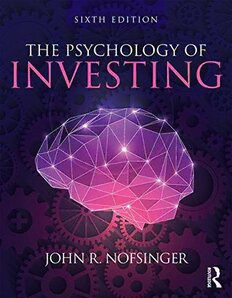
The Psychology of Investing PDF
Preview The Psychology of Investing
The Psychology of Investing While traditional finance focuses on the tools used to optimize return and minimize risk, this book explains how psychology can affect our decisions more than financial theory. Covering the ways investors actually behave, this is the first book of its kind to delve into the ways biases influence investment behavior and how overcoming these biases can increase financial success. Now in its sixth edition, this classic text features: An easy-to-understand structure, illustrating psychological biases as everyday behavior; analyzing their effect on investment decisions; and concluding with academic studies that exhibit real-life investors making choices that hurt their wealth. A new chapter on the biology of investment, exploring the latest research on genetics, neuroscience, and how hormones, aging, and nature versus nurture inform our investment behavior. An additional strategy for controlling biases, helping readers understand the psychology that motivates markets and how to address it. Experiential examples, chapter summaries, and end-of-chapter discussion questions to help readers test their practical understanding. Fully updated with the latest research in the field, The Psychology of Investing will prove fascinating and educational for advanced students in investment, portfolio management, and behavioral finance classes as well as investors and financial planners. An updated companion website includes an instructor’s manual, PowerPoint slides, and more. John R. Nofsinger is the William H. Seward Endowed Chair in International Finance and Professor of Finance at the University of Alaska Anchorage, USA. 2 “Nofsinger does an incredible job explaining why we sometimes make poor investing decisions. Read this book and save your wallet from self-inflicted pain and anguish!” Wesley R. Gray, CEO, Alpha Architect, USA “Each new edition of The Psychology of Investing offers added breadth and depth on this fascinating subject. Investors who lack awareness about the psychological aspects of finance can be their own worst enemies. Nofsinger’s current update of this highly insightful book is a must-read for all investors interested in improving their chances of achieving success in the market.” H. Kent Baker, American University, USA 3 The Psychology of Investing Sixth Edition John R. Nofsinger 4 Sixth edition published 2018 by Routledge 711 Third Avenue, New York, NY 10017 and by Routledge 2 Park Square, Milton Park, Abingdon, Oxon, OX14 4RN Routledge is an imprint of the Taylor & Francis Group, an informa business © 2018 Taylor & Francis The right of John R. Nofsinger to be identified as author of this work has been asserted by him in accordance with sections 77 and 78 of the Copyright, Designs and Patents Act 1988. All rights reserved. No part of this book may be reprinted or reproduced or utilised in any form or by any electronic, mechanical, or other means, now known or hereafter invented, including photocopying and recording, or in any information storage or retrieval system, without permission in writing from the publishers. Trademark notice: Product or corporate names may be trademarks or registered trademarks, and are used only for identification and explanation without intent to infringe. First edition published by Prentice Hall 2001 Fifth edition published by Routledge 2012 Library of Congress Cataloging-in-Publication Data A catalog record for this book has been requested ISBN: 978-1-138-71480-9 (hbk) ISBN: 978-0-415-39757-5 (pbk) ISBN: 978-1-315-23085-6 (ebk) Typeset in Warnock Pro by Apex CoVantage, LLC Visit the companion website: www.routledge.com/cw/nofsinger 5 For Anna, my wife and best friend. 6 Table of Contents List of Illustrations Preface ▶ 1 Psychology and Finance ▶ 2 Overconfidence ▶ 3 Pride and Regret ▶ 4 Risk Perceptions ▶ 5 Decision Frames ▶ 6 Mental Accounting ▶ 7 Forming Portfolios ▶ 8 Representativeness and Familiarity ▶ 9 Social Interaction and Investing ▶ 10 Emotion and Investment Decisions ▶ 11 Self-Control and Decision Making ▶ 12 Physiology of Investing Index 7 Detailed Table of Contents List of Illustrations Preface ▶ 1 Psychology and Finance Traditional Versus Behavioral Finance Prediction Behavioral Finance Sources of Cognitive Errors Bias and Wealth Impact What to Expect Summary Questions Notes ▶ 2 Overconfidence Overconfidence Affects Investor Decisions Overconfident Trading Overconfidence and the Market Overconfidence and Risk Illusion of Knowledge Who Is Overconfident? Illusion of Control Choice Outcome Sequence Task Familiarity Information Active Involvement Past Successes Online Trading Online Trading and Performance Summary Questions Notes ▶ 3 Pride and Regret Disposition Effect 8 Disposition Effect and Wealth Tests of Avoiding Regret and Seeking Pride International Tests of the Disposition Effect Disposition Outside the Stock Market Selling Winners Too Soon and Holding Losers Too Long Disposition Effect and News Reference Points Reference Point Adaptation Can the Disposition Effect Impact the Market? Disposition and Investor Sophistication Buying Back Stock Previously Sold Summary Questions Notes ▶ 4 Risk Perceptions House-Money Effect Snakebite (or Risk Aversion) Trying to Break Even Effect on Investors Endowment (or Status Quo Bias) Effects Endowment and Investors Perception of Investment Risk Memory and Decision Making Memory and Investment Decisions Cognitive Dissonance Cognitive Dissonance and Investing Summary Questions Notes ▶ 5 Decision Frames Framing and Choice Framing and Investing Framing and the Risk-Return Relationship Framing and Prediction Thinking Mode and Decision Processes Measuring Thinking Mode Risk Framing and Thinking Style Framing Financial Decisions Pension Decisions Payday Loans Claiming Social Security Summary 9 Questions Notes ▶ 6 Mental Accounting Mental Budgeting Matching Costs to Benefits Matching Debt Sunk-Cost Effect Economic Impact Can Money Make You Happy? Mental Accounting and Investing Investor Trading Asset Allocation Market Impact Summary Questions Notes ▶ 7 Forming Portfolios Modern Portfolio Theory Mental Accounting and Portfolios Perceptions on Risk Risk Perception in the Real World Building Behavioral Portfolios Household Portfolios Preferred Risk Habitat Naïve Diversification Retirement Plans Summary Questions Notes ▶ 8 Representativeness and Familiarity Representativeness Representativeness and Investing Extrapolation Bias Familiarity Familiarity Breeds Investment Local Bias Market Impacts What’s in a Name? Familiarity Breeds Investment Problems Combining Familiarity and Representativeness Biases Summary 10
